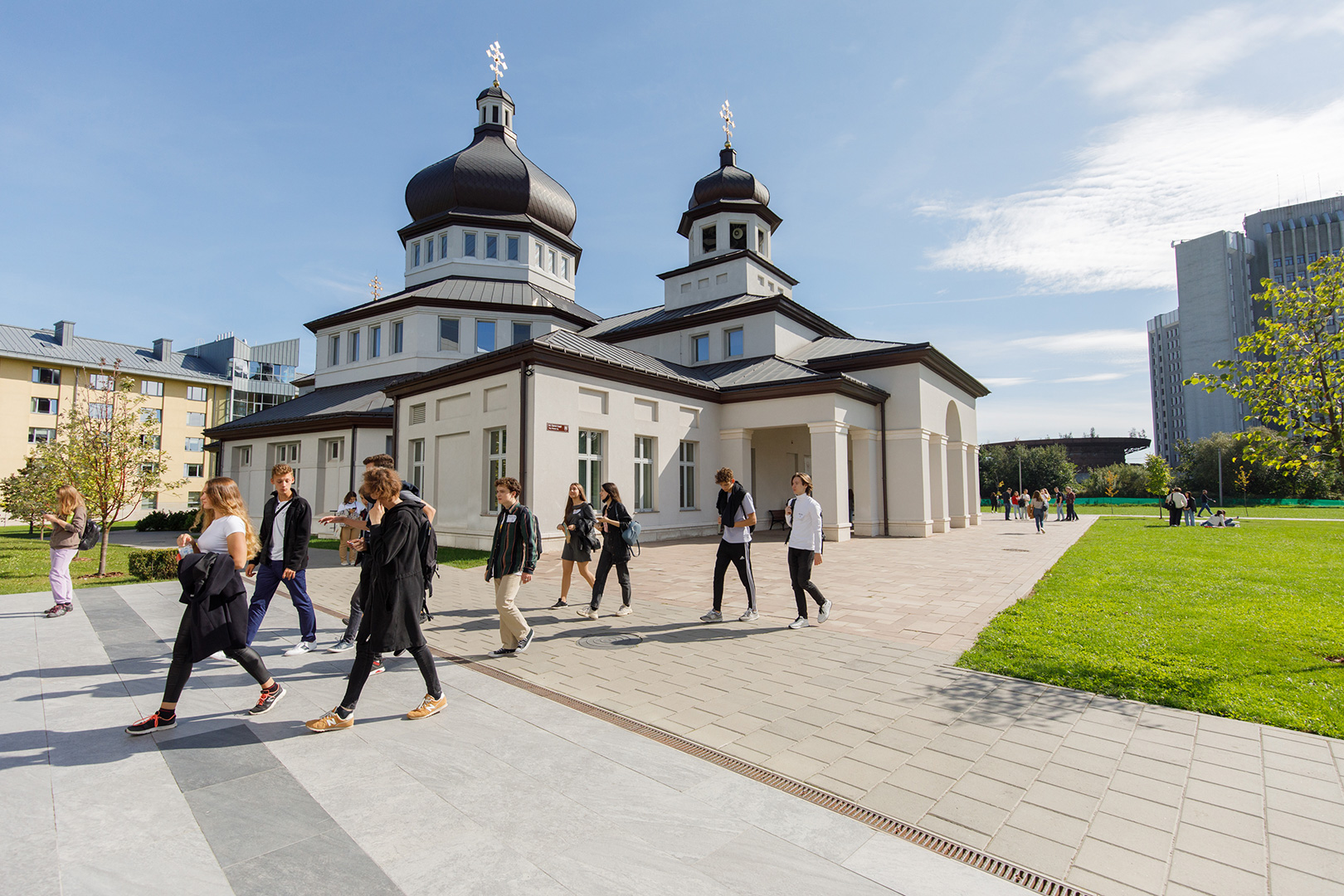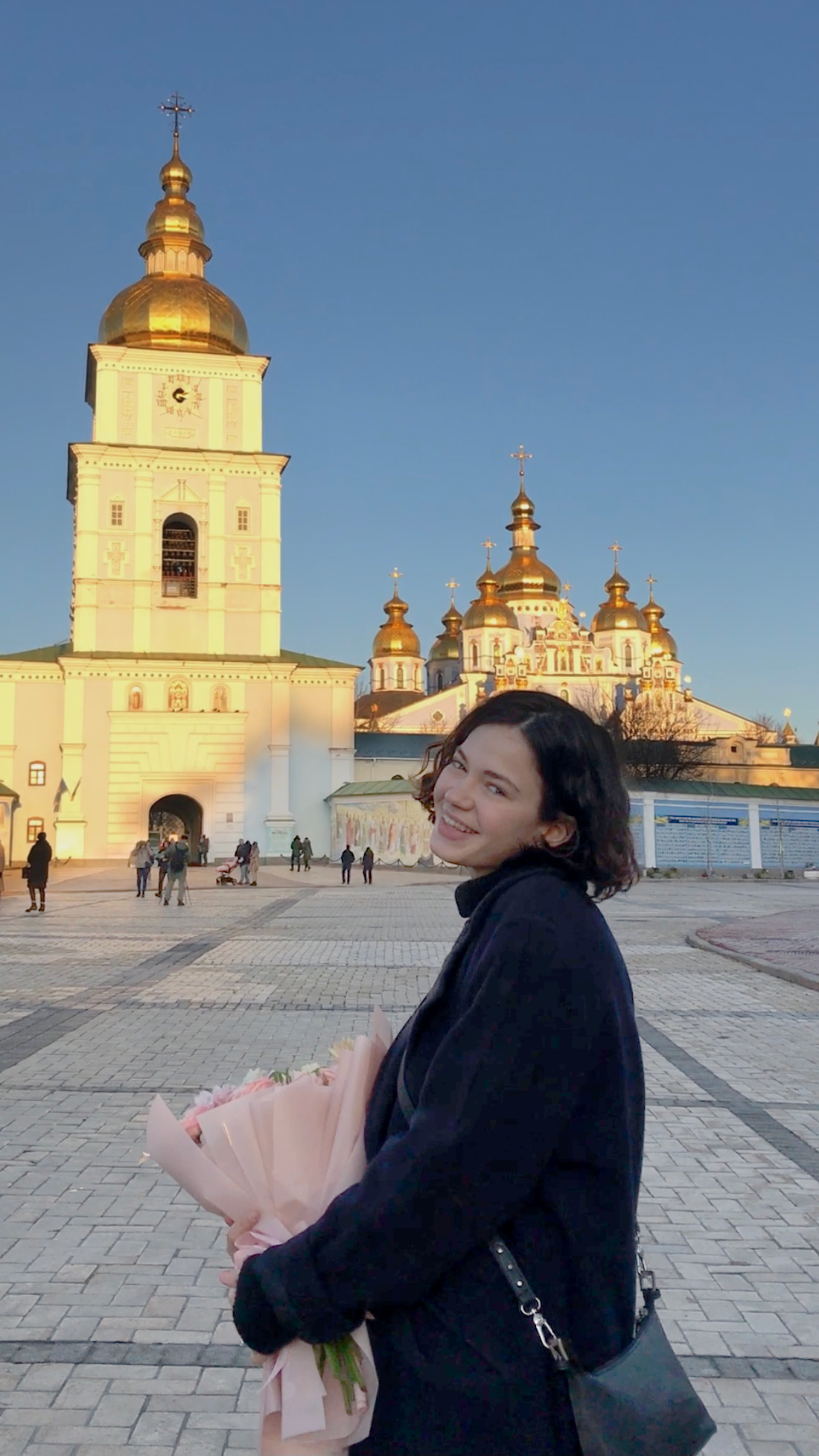 Students at Ukrainian Catholic University in the city of Lviv during a 2021 orientation. DePaul has opened its online courses to 100 Ukrainian college students. (Image courtesy of Ukrainian Catholic University)
Students at Ukrainian Catholic University in the city of Lviv during a 2021 orientation. DePaul has opened its online courses to 100 Ukrainian college students. (Image courtesy of Ukrainian Catholic University) Russian attacks have disrupted almost every facet of daily life in Ukraine, including the education of many college students. In response to a call for help from Ukrainian Catholic University and other higher education institutions in the region, DePaul University has welcomed more than 100 Ukrainian college students into 42 of its online courses this spring quarter.
Students from Ukraine are logging on to learn for credit, and DePaul has waived their tuition and fees.
“When presented with the opportunity to help, our staff and faculty immediately provided the logistics and support to make this happen,” says Salma Ghanem, provost of DePaul. “DePaul is living our Catholic, Vincentian mission by helping these students pursue their education while their country is under assault.”
Classes help Ukrainian students ‘enrich their learning’
Most of the students are from
Ukrainian Catholic University in Lviv, 40 miles from the Polish border. UCU is operating at a reduced capacity as some faculty have left to help family members or contribute to the war effort. DePaul has partnered with UCU in the past as part of its online
Global Conversations and, before the war, the two institutions had jointly planned to train and support groups of faculty to implement
Global Learning Experience projects.
 College student Marta Haiduchok pictured in Kyiv in 2021. She is living with family in Lviv while taking online courses with DePaul University. (Image courtesy of Marta Haiduchok)
College student Marta Haiduchok pictured in Kyiv in 2021. She is living with family in Lviv while taking online courses with DePaul University. (Image courtesy of Marta Haiduchok)“We are grateful to DePaul University for opening their courses for UCU and other Ukrainian students,” says Dmytro Sherengovsky, UCU vice-rector for academic affairs and internationalization. “This will not only help universities fill the gaps with classes that cannot be held as the result of war, but also give students a chance to enrich their learning experience through access to the best models of U.S. education.”
Marta Haiduchok is studying history at UCU and lives with her family in Lviv. She enrolled in two online DePaul courses this quarter — comparative politics and women and gender studies.
“I believe that history is inseparable from politics. In the case of my country, Ukraine, this is especially noticeable now,” Haiduchok says. Though both courses are theoretical, she sees practical applications every day as the people of Ukraine, including many women and children, suffer and die.
“I have been studying history in Ukraine for four years now, and I understand quite well how wars affect all spheres of human life. I want to know more so that I can do my best in writing and creating the history of this war together with others in Ukraine,” Haiduchok says.
Faculty across disciplines open their courses
DePaul faculty members across many disciplines welcomed Ukrainian students into their online classes, including business, communication, liberal arts, science and health, education, and computing and digital media. While most DePaul classes this spring are being held in-person or in a hybrid model, the university has increased its online course offerings since the outset of the COVID-19 pandemic. Faculty and staff powered that effort, and their knowledge and flexibility contributed to their readiness to help these students.
Professor Pascale-Anne Brault says the Ukrainian students in her French class have been true role models.
“Their eagerness to participate and their work ethics are setting the tone for the rest of the class,” she says. “In fact, one of the Ukrainian students is organizing an online study group open to all.”
One of these students is Sofiia Kekukh, who studies English at the National University of Kyiv-Mohyla Academy. She calls Brault’s course “wonderful” and says it has already improved her French pronunciation. She is also taking a digital media skills course with many “mini projects” that she believes will be useful in future employment.
Professor Elissa Foster teaches health communication and is welcoming three Ukrainian students into one of her courses. The course is mostly asynchronous, with one in-person meeting a week. When meeting in a Chicago classroom, they welcomed the first student from Ukraine via Zoom. Foster noticed DePaul students reaching out to the student immediately.
“All these numbers started appearing in the chat, and I realized our students were exchanging information so they could stay connected. That was exactly what I was hoping would happen,” Foster says.
Behind-the-scenes work by DePaul faculty and staff made the logistics of welcoming these students possible, explained GianMario Besana, associate provost for global engagement and online learning. From the registrar’s office to international and domestic admission, staff solved many technological and administrative puzzles to bring students into DePaul’s systems quickly.
Meghann Artes, a professor in the School of Cinematic Arts, is offering individualized film workshops to two Ukrainian students, a history major and a business major. The students shared stories about friendship and the war — one has a friend trapped in Mariupol.
“It’s their story to tell, and we’re here to support them,” Artes says.
Economics professor Rafael Tenorio is team-teaching Ukrainian students in an asynchronous online course with Gabriella Bucci. This allows students to complete most work on their own, but a student in Western Ukraine chose to join a chat in the middle of the night to connect with her classmates in Chicago in real time.
“It speaks to her commitment to learn and be engaged and to make the most of this opportunity,” Tenorio says.
###
Media contact:
Kristin Claes Mathews
kristin.mathews@depaul.edu
312-362-7735